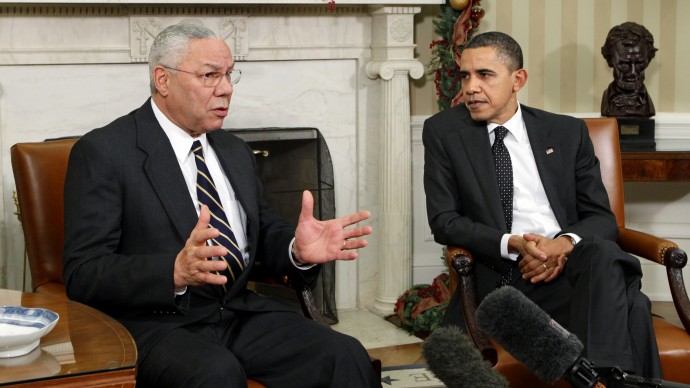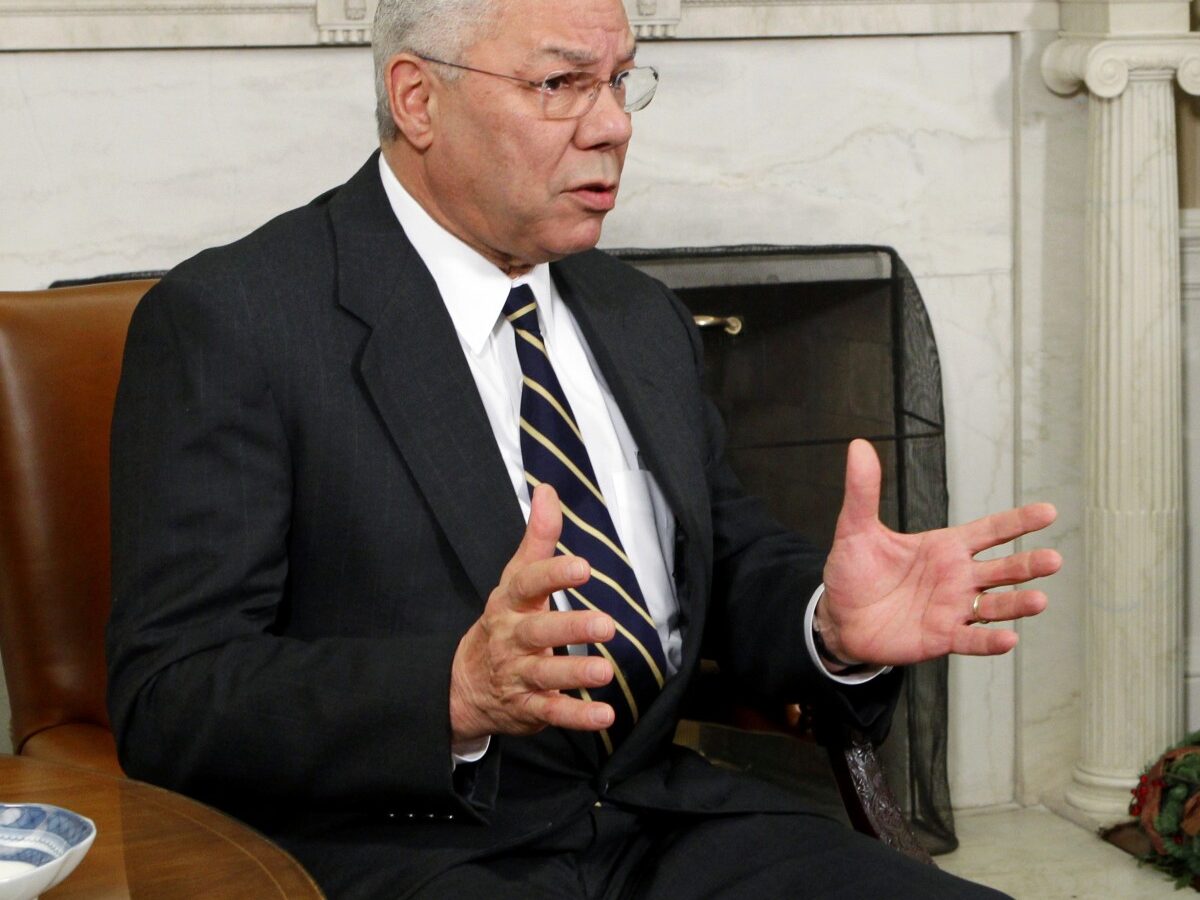
(MintPress) – For the second straight presidential election, former secretary of state and decorated former United States Army Gen. Colin Powell endorsed President Barack Obama.
While its impact is yet to be seen for the Obama campaign, its significance points to a political philosophy that has faded with bipartisanship: centrism. As a Republican, Powell’s endorsement of Obama is a cross-party gesture rarely seen in today’s polarized Democrat-Republican battle. In a time when 44 percent of Americans fault Republicans for gridlock in Congress and another 29 percent blame Obama, Powell stands as an anomaly in a divided landscape.
In his endorsement of Obama on CBS’ “This Morning,” Powell praised the upward trend of the economy and ending America’s involvement in the Iraq War. He also criticized Republican presidential nominee Mitt Romney’s stance on foreign policy, calling it a “moving target” that is currently different from the policies he ran on earlier in his campaign. Powell said the country should not change its current course in favor of a radically different plan.
“You know, I voted for him in 2008 and I plan to stick with him in 2012, and I’ll be voting for he and Vice President Joe Biden next month,” Powell said. “I think we ought to keep on the track we are on.”
Powell also noted that the shock value of his endorsement speaks to the current political environment, where many politicians are more concerned with falling in line with their party than legislating for their constituents.
“I think I’m a Republican of a more moderate mold and that’s something of a dying breed, I’m sorry to say,” Powell said.
His own man, his own policies
Powell’s autonomy comes after playing a central role during the first half of George W. Bush’s presidency. He succeeded Madeleine Albright in becoming the 65th U.S. Secretary of State and ultimately supported a decision to invade Iraq in wake of the Sept. 11 terrorist attacks. Despite his initial support of the war, Powell broke away from the Republican mindset in 2009 by admitting U.S. troops should have left Iraq as early as 2003 after seeing military force had little impact on the country’s political progress – urging a more diplomatic approach.
Arguably one of Powell’s most controversial moments, however, came during the height of the war in 2003 when he testified in front of the United Nation’s Security Council and claimed that Iraq was harboring biological weapons. Powell urged the council that then-Iraqi President Saddam Hussein posed a direct threat to America despite no evidence that Iraq or Hussein had any involvement in the attacks.
John McCain, a Republican senator from Arizona and 2008 Republican presidential nominee, said Powell’s endorsement of Obama further taints his position within the Republican Party.
“Well, I’m just saddened because, you know, I used to be a great admirer of Colin Powell. We were friends. I think one of the sad aspects of his career is going to the United Nations Security Council and telling them things about Iraq that were absolutely false,” McCain said. “… All I can say is that Gen. Powell, you disappoint us and you have harmed your legacy even further by defending what has clearly been the most feckless foreign policy in my lifetime.”
But by the beat of his own drum is the only way Powell knows how to march. He is a moderate Republican who often leans the way of Democrats: In regards to abortion, Powell is pro-choice; he is in favor of gun control measures and is a proponent of affirmative action. And as the views of political parties have largely remained unchanged in the past 20 years, Powell has altered his stances with the times.
His most recent stance that dissented from the GOP platform was the repeal of the military’s “don’t ask, don’t tell” policy. In 1993, Powell was instrumental in the passage of the policy, which barred openly gay, lesbian or bisexual members from serving in the military. But in 2010, when a formal proposal was made to repeal the policy, Powell took the more liberal stance and supported the repeal, saying “circumstances had changed.”
Reihan Salam, a policy adviser for e21, an economic research group, wrote in a piece for CNN that it takes individuals like Powell to help write policies because they are willing to take aspects from both ends of the political divide and decide on which they feel is best. Salam noted that those individuals are beneficial in a political era where simply voting down party lines has become commonplace.
“Some believe that blurring the boundaries of the two major political parties would be a very good thing as it would make legislative compromise more likely,” Salam wrote. “Historically, it is certainly true that avowedly centrist legislators, such as the Southern congressional Democrats who worked closely with Republican presidents such as Richard Nixon and Ronald Reagan, have played an important role in shaping policy.”
The lost moderate
During the Republican presidential debates, Romney was skewered by his opponent for having past centrist viewpoints during his tenure as governor of Massachusetts, dubbing him the “Massachusetts Moderate.” But that “moderate” is very well someone Powell could have easily worked with. But the ideological center is far from celebrated in today’s political climate.
The RAND Corporation, a research institute that focuses on public policy, said a myriad of factors have contributed to the polarized state of politics. As social issues have become political fodders over the past decade, issues such as same-sex marriage and voter ID laws have painted a black-and-white policy picture. RAND says the dichotomy stems from issues that legislature presents that are solved with “yes” or “no” answers. Issues such as the economy leave room for multiple facets to be considered, whereas social issues generate a divide.
“Ordinary voters are also sorting themselves more tightly into the parties that align with their core values, and ideological concerns are playing a larger role in politics,” RAND wrote in a report on political polarization. “As the parties have moved further apart, there has been a marked decline in legislative centrists who bridge the parties and broker crucial compromises. Within each party, the members of Congress have become more internally homogeneous in voting and in their underlying beliefs.”
David Swerdlick, a contributing editor and political columnist at the New York Daily News, wrote that there could still be a place for Powell in politics, but he noted that Powell’s stance on issues has always been best suited for a different time in American history, when the political right and GOP were not such an extreme deviation from the party’s initial platform.
“Saying that ‘I’m a Republican of a more moderate mold and that’s something of a dying breed, I’m sorry to say,’ today’s GOP is becoming unrecognizable to Powell,” Swerdlick wrote. “His brand of Republicanism fits with the ‘compassionate conservatism’ of George H.W. Bush – the president under whom Powell served as Chairman of the Joint Chiefs of Staff – Mitt’s late father, Michigan Gov. George Romney and Massachusetts Sen. Ed Brooke, the GOP’s last African-American to serve as governor or U.S. senator.”


